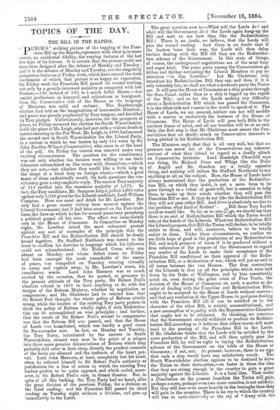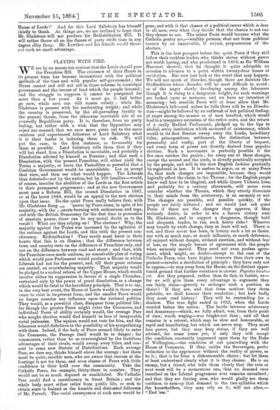TOPICS OF THE DAY.
THE BILL IN THE RAPIDS.
Li p UNCH'S " striking picture of the tugging of the Fran- chise Bill up the Rapids, represents with what is, to some extent, an accidental fidelity, the varying features of the last few days of its history. It is certain that the picture could not have been designed after the debates of Monday and Tuesday ; and it is the debates of Monday and Tuesday, not the singularly prosperous fortunes of Friday week, which have caused the fresh excitement of which that picture is so happy an expression. On Friday week the Franchise Bill passed its second reading, not only by a greatly-increased majority as compared with last Session,-140 instead of 130, in a much fuller House,—but amidst professions as honeyed, and salutations as benignant, from the Conservative side of the House, as the language of Ministers was mild and radiant. The Scarborough election had told on the imaginations of honourable Members ; and peace was piously prophesied by Tory tongues, and heralded by Tory pledges. Unfortunately, however, for the prospects of peace, on Friday occurred the election for South Warwickshire, to fill the place of Mr. Leigh, who had met with a violent death in mountaineering in the Far West. Mr. Leigh, in 1880, had secured the second seat in South Warwickshire for the Liberal Party, in a contest in which he was beaten by only 114 votes by Sir John Eardley-Wilmot (Conservative), who came in at the head of the poll. On Friday the contest was renewed under very exciting circumstances. The question for the constituency was not only whether the farmers were willing to see their labourers enfranchised on like terms with themselves,—which they are not,—but whether they would like a little help in the shape of a fixed duty on foreign wheat,—which a good many of them undoubtedly would. On both questions the con- stituency gave a very emphatic reply. The narrow Tory majority of 114 swelled into the enormous majority of 1,176. In fact, the Tory candidate, Mr. Sampson Lloyd, polled 3,095 votes against only 1,919 given for the Liberal candidate, Lord William Compton. Here was meat and drink for Mr. Lowther. Not only had a great county victory been secured against the Liberal Government, but it had been secured on the Fair-trade lines, the lines on which he has for several years been preaching a political gospel all his own. The effect was immediately seen in the House of Commons. In Committee on Monday night, Mr. Lowther raised the most vehement protest against any sort of surrender of the principle that the Franchise Bill and the Redistribution Bill should be firmly bound together. Sir Stafford Northcote was forced to the front to reaffirm his doctrine in language which his followers could not misunderstand. Sir Richard Cross, who was absent on Monday, and whose dulcet tones on Friday had been amongst the most remarkable of the omens of peace, was compelled on Tuesday evening virtually to unsay and explain away, in Mr. Lowther's sense, his conciliatory words. Lord John Manners was so much excited by the occasion, that he quoted, as germane to the present attitude of the Tory party, Sir Robert Peel's absolute refusal in 1831 to have anything to do with the designs of the Reform Ministry, whether by negotiation or compromise ; and Mr. Gladstone had to remind him that Sir Robert Peel thought the whole policy of Reform utterly wrong, while the leaders of the existing Tory party profess to think the policy of Reform wholly right, if only Redistribu- tion can be accomplished on wise principles ; and further, that the result of Sir Robert Peel's refusal to compromise was that the Reform Bill was passed, and that the House of Lords was humiliated, which was hardly a good omen for No-surrender now. In fact, on Monday and Tuesday, the Tory Party, intoxicated by the success in South Warwickshire, seemed very near to the point of a relapse into those more genuine denunciations of Reform which they probably still utter in their sleep, directly the prudent counsels of the brain are silenced and the instincts of the heart pre- vail. Lord John Manners, at least, completely lost his head, when he referred himself to Sir Robert Peel's authority as justification for a line of action to which the existing Tory leaders profess to be quite opposed, and which ended, more- over, in Sir Robert Peel's case, in dismal disaster. But, in spite of all this barking, the Tory Party had no heart, after the great division of the previous Friday, for a division on the third reading ; and the Franchise Bill passed its third reading on Tuesday night without a division, and goes up immediately to the Lords. The great question now is,—What will the Lords do ? and what will the Government do if the Lords again hang-up the Bill and wait to see how they like the Redistribution Bill ? There is no doubt, we believe, that the Lords will pass the second reading. And there is no doubt that if the leaders have their way, the Lords will then delay further dealing with the Bill till they see the Redistribu- tion scheme of the Government. In this state of things, of course, the underground negotiations are of the most busy and eager kind. The peace party among the Conservatives go hither and thither entreating the Liberal Members to pay no attention "to Jim Lowther." Let Mr. Gladstone only introduce his Redistribution Bill, they say, and then if it is only tolerably fair, we shall see what a moderate party the Tories are. It will pass the House of Commons as a ship passes through the Suez Canal, rather than as a ship is lugged up the rapids of the Nile ; and as for the Lords making any difficulty about a Redistribution Bill which has passed the Commons, it is the idlest talk and rumour in the world to speak of it. The House of Lords, we are assured, neither can nor will meddle with a matter so exclusively the business of the House of Commons. The House of Lords will pass both Bills in the meekest frame of mind, and all our troubles will be at an end. Only, the first step is that Mr. Gladstone must assure the Con- servatives that no deadly attack on Conservative interests is being plotted in his Redistribution Bill.
The Ministers reply that that is all very well, but that no pressure can screw out of the Conservatives any coherent account of what they intend to regard as a deadly attack on Conservative interests. Lord Randolph Churchill says one thing, Sir Richard Cross and Whigs like the Duke of Argyll and Mr. Goschen say a totally opposite thing, and nothing will induce Sir Stafford Northcote to say anything at all on the subject. Now, the House of Lords have always maintained that the production of the Redistribu- tion Bill, on which they insist, is not a mere form to be gone through as a token of good-will, but is essential to help them to make up their minds whether they will pass the Franchise Bill or not. If they do not like the Redistribution Bill they will not pass either Bill. And there is absolutely no clue to the problem what kind of Rediste 1Bill these Tory Lords could or would like. So far as we can it-ge, we should say that there is no sort of Redistribution Bill which the Tories would take at the hands of the Liberals. Whatever Redistribution Bill the Liberals propose, that Bill the Tories will declare to be totally unfair to them, and will, moreover, believe to be totally unfair to them. Under these circumstances, we confess we see little hope of good in the production of any Redistribution Bill, and much prospect of harm if it be produced without a firm reiteration of the purpose of the Government to regard any resolve of the Lords to make their acceptance of the Franchise Bill conditional on their approval of the Redis- tribution Bill, as a declaration of war, which will put an end to all terms between the two Houses. The firm contention of the Liberals is that on all the principles which were laid down by the Duke of Wellington, and by him consistently acted on, even during the great crisis of Free Trade, the decision of the House of Commons, on such a matter as the order of dealing with the Franchise and Redistribution Bills, ought to be accepted by the House of Lords without reserve ; and that any resolution of the Upper House, to postpone dealing with the Franchise Bill till it can be satisfied as to the character of the other Bill, is strictly unconstitutional, and a new assumption of equality with the Representative Chamber that ought not to be tolerated. So thinking, we conceive that the Government should withhold or produce its Redistri- bution Bill according as it believes that either course will most tend to the passing of the Franchise Bill in the Lords. If Mr. Gladstone thinks that the Lords will be satisfied by the mere production of the Bill, and will then quietly pass the Franchise Bill, he will be right in laying the Redistribution scheme of the Government on the table of the House of Commons ; if not, not. At present, however, there is no sign that such a step would have any satisfactory result. The South Warwickshire election appears to be destined to drive the Tories to their destruction,—to foster in them the idea that they are strong enough in the country to gain a great majority against the Liberals. It is a fatal idea. That under a Dissolution on the present franchise the Tories will gain, perhaps a score, perhaps even two score counties, is not unlikely. But they will lose even more heavily in the boroughs than they will gain in the counties. There is no cry to which the country will rise so enthusiastically as the cry of "Away with the House of Lords !" And for this Lord Salisbury has himself chiefly to thank. As things are, we are inclined to hope that Mr. Gladstone will not produce his Redistribution Bill. It will rather throw oil on the flames of party strife than in any degree allay them. Mr. Lowther and his friends would there- out sack no small advantage.



































 Previous page
Previous page